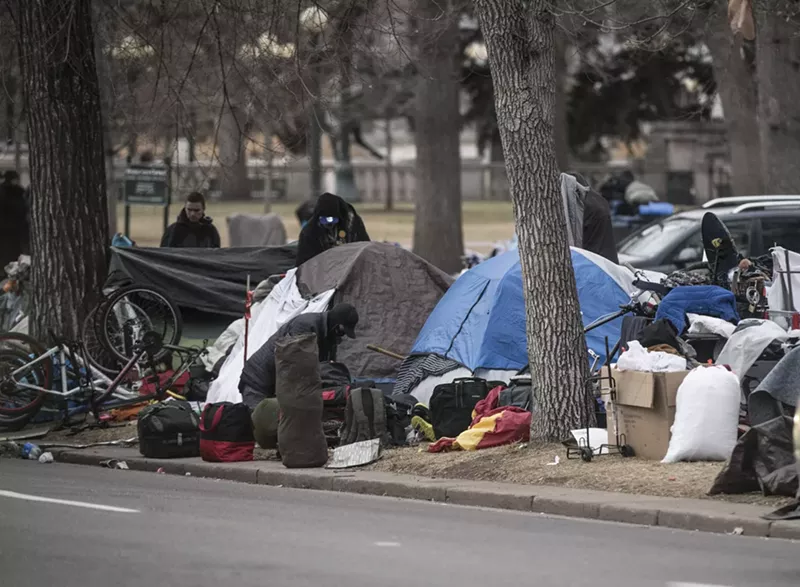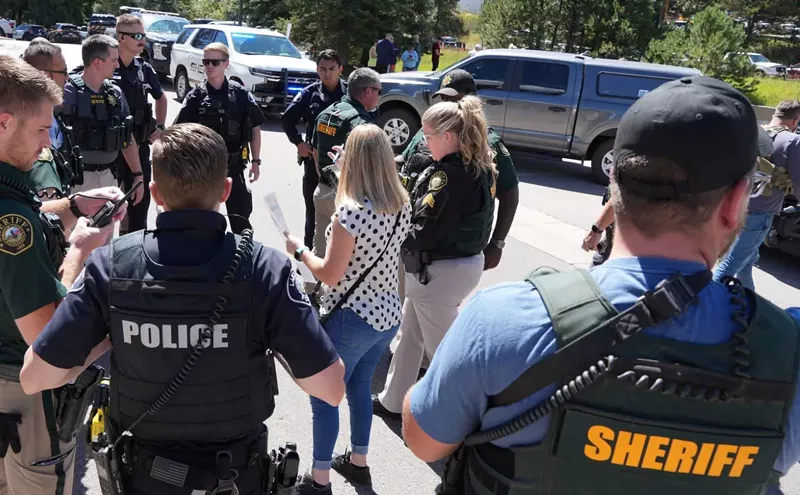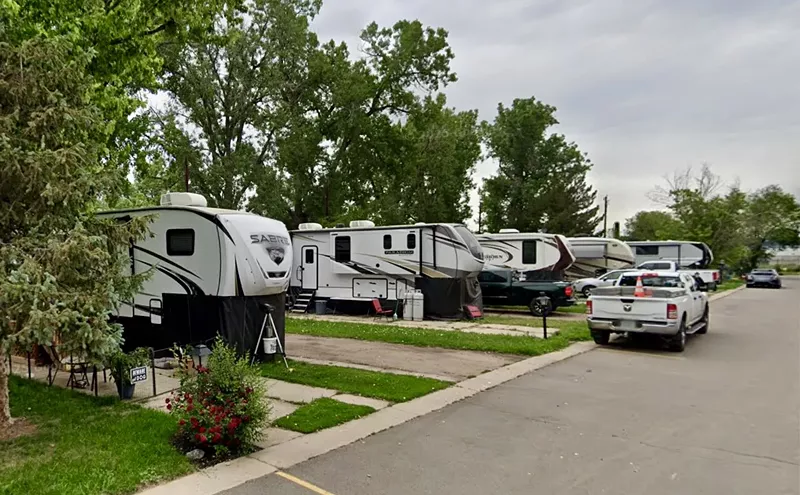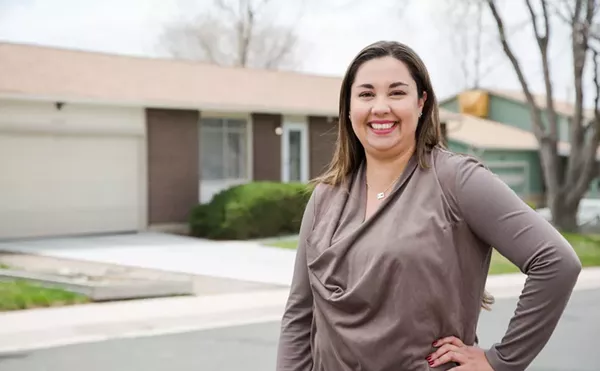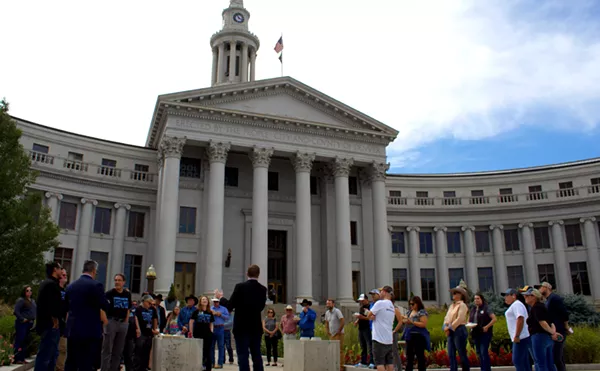Colorado is seeing a surge of residents who can’t pay their rent because of layoffs, furloughs and pay reductions in response to economic cuts brought on by the coronavirus pandemic. And there's nowhere for many of them to go.
Cathy Alderman, vice president of communications and public policy at the Colorado Coalition for the Homeless, says that increased demand has recently overwhelmed homeless shelters, which have little to no space. Hundreds of tents are lined up behind the Stout Street Health Center at 21st and Stout streets, she notes, while immediately behind them are two empty, brand-new, market-rate luxury apartment buildings.
“It’s so striking,” she says.
While she doesn't believe that evictions alone are responsible for the unprecedented increase in homelessness, she says they are playing a significant role. And the crisis has just begun. “We are a homeless response system that is stretched to the very thinnest we’ve ever been — with resources and staffing and locations," she adds. "And the idea that somehow we would be able to help another 800 or 1,000 people in the coming weeks is just unfathomable. It causes a lot of anxiety for us. How are we going to help people find homes?”
On July 12, Governor Jared Polis extended and amended an executive order mandating that state agencies help prevent the evictions of tenants economically harmed by COVID-19. The order, which expires thirty days from July 12, states that landlords must provide tenants with thirty days’ notice of any default for non-payment that occurred on or after March 10 before filing action for forcible entry and detainer. The typical eviction notice requirement is ten days, so under this extension, anyone who receives a notice within the next month has twenty extra days to respond before a landlord initiates an eviction.
The new order extends a June 13 edict that directed the executive director of the Department of Local Affairs to work with landlords to assist individuals who are unable to pay rent, and prohibited landlords/lenders from charging late fees or penalties. It also encourages municipalities and jurisdictions to suspend restrictions that place limits on how many people can live in a household, as well as restrictions on how many days people can stay in hotel rooms.
But Teva Sienicki, the CEO of Metro Caring, a front-line anti-hunger organization in Denver, says that order won't prevent the high number of eviction actions the courts will see in coming months: “How are those who cannot find work, those who are still struggling to access unemployment benefits, supposed to pay rent, utilities, healthcare, and put food on the table for their families?" she asks in a statement. "Allowing the courts to move forward with evictions during a public health and economic catastrophe will create a homelessness and hunger crisis of cataclysmic size and scope."
According to attorney Darren O’Connor, landlords are still filing motions, despite the governor's order; the motions just aren’t being processed by the courts. “They’re sitting in a queue in courts all over the state, and there will be a flood of enforcement in the coming weeks,” he says. “If Jared Polis doesn’t take action soon, we’re about to see thousands, if not tens of thousands, of people being evicted.”
Jack Regenbogen, a lawyer specializing in housing who works with the Colorado Center on Law and Policy, agrees, predicting a flood of eviction notices as each order expires. While Regenbogen acknowledges that the governor did give tenants an additional twenty days to try to access funds or find new housing, he says that more needs to be done. “This action — or rather inaction — by the governor really does nothing to prevent the coming tide of evictions, displacement and homelessness," he says. "It was quite disappointing to see."
With the support of over ninety organizations and individuals working on housing issues, Regenbogen submitted a letter to Polis asking for an expansion of the executive orders to extend basic protection against eviction as Colorado courts resume eviction hearings.
The letter calls for the implementation of four policies: a reasonable repayment plan from landlords before attempting to collect or initiate an eviction; the opportunity for tenants to to pay overdue rent up until 48 hours after a judge issues a writ of restitution; information about telephonic court cases included as an attachment to any court summons and available in English and Spanish; and clarification about whether property is covered under the CARES Act as an attachment to an eviction petition.
Regenbogen says he has received no response from Polis's office.
In response to a query from Westword, Polis spokesman Conor Cahill sent this statement: "The Governor took bold action to enact a moratorium on evictions while Colorado’s economy was frozen under Stay at Home this Spring to prevent massive loss of life from COVID 19. Now that Colorado’s economy is open we have taken common-sense steps to ensure that renters have the opportunity to get on their feet. On July 12, Governor Polis extended his executive order to ensure that renters have time to work out a reasonable repayment plan. This plan protects both tenants and landlords."
Anti-eviction activists aren't pinning all of their hopes on the governor, however. While executive orders can be critical, Zach Neumann, founder of the COVID-19 Eviction Defense Project, notes that it's critical for tenants experiencing eviction to have legal help. “All evidence both in Colorado and through studies conducted outside of Colorado indicates that on average, tenants with counsel experience eviction at a lower rate, and additionally, generally have better financial outcomes,” he says.
Colorado is already taking steps to provide added legal assistance for renters experiencing eviction.
The No Eviction Without Representation initiative, which will appear on the Boulder ballot in November, seeks to provide universal free legal counsel, education and rent assistance to all Boulder tenants facing eviction. According to campaign chair Ruy Arango, this will be the most comprehensive and advanced anti-eviction program in the country.
Arango expects to see a “tsunami” of evictions at the end of this month not only in Boulder, but across the country. “There needs to be a federal right-to-counsel program that provides a public defender for those that experience eviction. Even before the COVID crisis, there was a growing eviction epidemic,” he says. “We need better tenant protection and tenant rights. It’s a tragedy.”
The state already has an Eviction Legal Assistance Fund, established in 2019 by the Colorado General Assembly to expand the availability of legal assistance for indigent persons who are experiencing an eviction or are at immediate risk of an eviction. The program is currently looking for people who can provide such assistance; the deadline to apply for this fiscal year is July 27.
In 2021, $600,000 will be available through this program, with an additional $350,000 through House Bill 1410, which provides COVID-19-related housing assistance to Coloradans by allocating federal funds from the CARES Act.
At the city level, Denver's Department of Housing Stability funds an eviction defense program; it was started as a Denver City Council pilot program in 2018, but now receives annual funding.
According to Neumann, the most widespread solution to the eviction crisis would be federal rent relief through the HEROES Act, which passed the U.S. House of Representatives in May but was considered “dead on arrival” in the Senate. The act would have provided $100 million in rental assistance, and renters struggling to pay rent would access those funds through local and state programs.
The Senate is set to return to work July 20 through August 7, and the Colorado Coalition for the Homeless's Alderman is holding on to hope for the passage of some version of the act. Senator Michael Bennet is in support of it, she notes, but Senator Cory Gardner has yet to give his support. “We need both of our senators to be engaged on this issue,” Alderman says.
For now, she adds, the governor should focus on more statewide action that can help stop or at least slow the eviction/homelessness cycle. “We’re so restricted in terms of finding funding,” she says. “The governor could step in and either provide another delay on evictions — especially those related to COVID — or require landlords to enter into repayment plans.”
Neumann takes it a step further: He believes another moratorium is the best course of action for Polis. “I think ultimately, so long as parts of the economy are shut down, we should have stronger protections in place for tenants to include an executive order that puts a moratorium on evictions until the state of emergency is declared over,” he says. “It’s not too late. There are things to be done that would really lower the risk.”

Audio By Carbonatix
[
{
"name": "GPT - Billboard - Slot Inline - Content - Labeled - No Desktop",
"component": "23668565",
"insertPoint": "2",
"requiredCountToDisplay": "2"
},{
"name": "STN Player - Float - Mobile Only ",
"component": "23853568",
"insertPoint": "2",
"requiredCountToDisplay": "2"
},{
"name": "Editor Picks",
"component": "17242653",
"insertPoint": "4",
"requiredCountToDisplay": "1"
},{
"name": "Inline Links",
"component": "18838239",
"insertPoint": "8th",
"startingPoint": 8,
"requiredCountToDisplay": "7",
"maxInsertions": 25
},{
"name": "GPT - 2x Rectangles Desktop, Tower on Mobile - Labeled",
"component": "24956856",
"insertPoint": "8th",
"startingPoint": 8,
"requiredCountToDisplay": "7",
"maxInsertions": 25
},{
"name": "Inline Links",
"component": "18838239",
"insertPoint": "8th",
"startingPoint": 12,
"requiredCountToDisplay": "11",
"maxInsertions": 25
},{
"name": "GPT - Leaderboard to Tower - Slot Auto-select - Labeled",
"component": "17676724",
"insertPoint": "8th",
"startingPoint": 12,
"requiredCountToDisplay": "11",
"maxInsertions": 25
}
]

